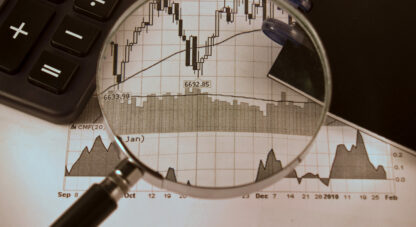Podcast: Play in new window
- How decentralized cryptocurrencies could become the utopian dream of centralized control
- 5000 years of gold decentralization vs 10 years of quasi cyber privacy
- Does the NSA know who’s crypto transacting? Ask Assange & Snowden?
The McAlvany Weekly Commentary
with David McAlvany and Kevin Orrick
“When you take your money for granted and forget the governmental penchant toward abuse of their privilege and power, and instead, as people just merely trust – guess what? Governmental authority then has the opportunity to do their bidding from a policy perspective, and there is a consequence, there is a price to be paid, literally, in the money.”
– David McAlvany
Kevin:Dave, we brought back some memories last night as we were sitting outside your airstream camper that you had set up out in your driveway. It was a little bit like a camping trip away from home. You poured a little Talisker for me and we sat and just reminisced as we talked about some of the things we are going to talk about today. The Argentinian trip, that once in a lifetime trip that came up three-and-a-half to four years ago, not only was it instructive, but boy, I got to see the pictures for the first time, actually, last night. What a great memory.
David:There were aspects of the trip which were of particular interest, given your study of astronomy. You got to see the Magellanic Clouds and the Southern Cross and other constellations that, being in North America, that are not in our view of the night sky. Then there were other aspects of the trip that stood out to us both from an economic and monetary perspective, as well.
Kevin:Absolutely. Going to a country that was experiencing what we would consider high inflation at that time was very instructional, because really, the only other time I had been to a country that had high inflation was my memories of America back in the 1970s when we had double-digit inflation. But the Argentinians were experiencing about 40% inflation if I remember right. Was that four years ago?
David:Yes, it was fascinating, a conversation I had with an executive who worked for Nike, actually did outsourcing work for Nike. A number of years ago I sat on a plane with a gentleman who had a contract with Nike, who lived in South America, actually in Argentina. He was explaining to me the ways in which he would bid on a contract, how Nike pushes all of the risk onto the people who are manufacturing. So on a given year, if there is inflation in the commodities, or wages, or whatever, you may go a year, two years, three years as a contractor not making any money at all. But hey, at least you’re in line with Nike.
But his compensation he tied specifically to U.S. dollars. I thought that was fascinating because while he could not do that for the company and the contract as a whole, he had this little carve-out for himself which basically allowed him to adjust for inflation because he was tied to U.S dollars and he was not ravaged by the effects of the Argentinian inflation.
Kevin:Isn’t it interesting? We had to find ways of actually guarding ourselves from the inflation just in the short period of time that we were there. But if you were Argentinian you couldn’t do like we could, Americans coming in. Bitcoin was playing a role even back in 2014.
David:October 2014 bitcoin was already being used in Argentina and that is, of course, due to the chaotic nature of the Argentine peso. You had the Kirchner dynasty that had so focused on social programs and appeasement of the masses that the currency was being crushed. So it went from an exchange rate of 3.5 pesos to the dollar to north of 8.5-to-1, and that was in 2014. The exchange rate now is north of 20-to-1 – those are the official rates
And I think you can reflect and say that since the Kirchners have left the economy has improved. Export restrictions have been lifted, and you have capital controls which had clamped down on the inter-border flow of capital. That has largely been reversed. So the currency is still working off the legacy, I think, of the Kirchners, and the economy is, in fact, moving toward a healthier state. But the problem in Argentina was, and is, how do you protect savings from the ravages of inflation?
Kevin:That is a question that we all have if we’re in a fiat currency system, but if you go to a country where it is happening in a quicker time period, you actually get a chance – it was like a high-speed lesson in how to survive inflation.
David:There is a general sense of social and financial insecurity in a place where there is high inflation or hyper-inflation.
Kevin:The question is, how do you get out of the system? You have to sometimes say, “Is it legal, and how do I get out of the system? And even if it’s illegal, how do I get out of the system to survive?”
David:That’s right. So you have the survival aspect. You have, “how do I get out of the system?” Or is it just inevitable that wages get crushed in terms of purchasing power, and the consequence socially is that anxiety increases and stress over making ends meet becomes something common even for the wealthy, dealing with that daily issue. How do you step outside of the fray? The consequences are more than economic, as we talk about social anxiety. Argentina, believe it or not, has the highest number of psychologists per capita in the world. And you wonder if chronic inflation isn’t a major contributor to angst and psychosis.
Kevin:Do you remember when we first got off of the plane and we got into the taxi? The first thing that the taxi driver was telling us was about leather shops. He said, “This is a really good leather shop.” It was sort of a wink-wink, nod-nod, like we were asking about leather, and to be honest with you, I didn’t care anything about Argentinian leather when I got in there. But I understood later why he was doing that.
David:Yes, he knew of one – there was a great one just around the corner. The country of Argentina consumes more beef per capita than any country in the world, and I’m not going to try to tie psychology and beef consumption together.
Kevin:Maybe that’s the psychosis (laughs).
David:(laughs) I’m going to say that as a carnivore I do not see the connection there. I choose not to see it (laughs). But no, it is interesting, you would expect them, if they are a large consumer of beef to have lots of leather products. But that is not really what he was getting at in terms of the leather shop around the corner. He wasn’t pitching leather or leather products.
Kevin:He knew we had dollars in our pocket.
David:That’s right, and this was about black market exchange rates which made the official exchange rate look like a joke. It was a joke. The official rate was for the world to see – that’s the published rate by the government. “Nothing wrong in Argentina,” is basically what was being put in print. But the blue market rate…
Kevin:Which was the black market. They called it the blue market instead of the black market.
David:Exactly. That is the term used for the street exchange rate. Instead of 8.5-to-1, if memory serves correctly, I think it was between 11 or 12-to-1. You may recall more precisely.
Kevin:I think we even got closer to 14, if we had 50-dollar bills. If you recall, they liked larger bills, as well.
David:This is one of the many benefits of travel – seeing the world as it is versus the way media, the way political factions, the way corporate interests would advertise it to be. And there is a widening gap between official perspectives and the actual experience of the common man. If you reflect on the 2016 election cycle here in the U.S., it explains much of the surprise in the Trump election between the official narrative and the experience of the man-on-the-street. You have the middle states, which, very much like the middle class, are in a fight for survival from the daily pressures.
And some of those pressures, frankly, come from – if you want to think of it almost as a coastal vice grip – you have folks on each side of the country who benefit from monetary and fiscal policy largesse, and so while they are the constituents that benefit from some sort of status quo policies, the unintended consequences are borne by other people.
Kevin:And I’m seeing that, Dave. I was just talking to someone here in the office. These last few days I have had a number of conversations – I think three conversations – with people who were doing fine for years, but they are having to sell their gold at this point because they are just running out of money. The thing is, they can’t understand it because they haven’t changed their lifestyle significantly, they haven’t raised their lifestyle, in fact, they have cut back significantly. But there is this inflation creep that squeezes the middle, and you don’t necessarily see that. We talked last week about walking around Washington, D.C. during the recession, but Washington, D.C. didn’t have a recession.
David:It’s the last place to run out of money.
Kevin:Exactly. But the people who have to work for the money are running out of it.
David:Back to Argentina and Buenos Aires. We reflected at the time on how significant it was that instead of trading goods as an expression of free enterprise, the entrepreneur was placed at a disadvantage by monetary and fiscal policies, and it forced him or her to waste time preventing what is a disruption to normal business endeavors via a currency cruciform. Currency speculation becomes the means of survival. It becomes the way that an entrepreneur stays afloat. Currency speculation, not trade in goods and services. We think of currency speculation as an opportunity for investment gain, and there is actually an advanced inflation where everyone becomes a speculator.
Kevin:The other thing they become is a criminal, and this is the sad thing because you can have people with high moral standards, high ethical standards, who cannot feed their children, or themselves, unless they break these ridiculous rules, like these false currency exchange rules that the Kirchner government set up. So everyone, in a way, had to be illegally operating in this blue market just to survive.
David:It’s fascinating, too, to reflect back on any of the major world conflicts, and when you’re in a period of war, the rules get set aside, and new rules get adopted, so things like foreign currency exchange or the buying and selling of goods, the limitation of that price-setting for those goods – all of these things – if you don’t follow the rules it’s no longer a question of legal versus illegal, you could be deemed an enemy combatant.
Kevin:An enemy of the state.
David:Exactly. It’s taken to a whole different level. So play by the rules, at least in Argentina, and get slaughtered like the cows that provide the hides for your stock in trade. Break the rules, and you have the opportunity to survive and fight another day. So every Argentine prefers to be paid in U.S. dollars, or is immediately shifting to a currency alternative, whether it is dollars or the cryptocurrencies. Bitcoin was sort of the singular cryptocurrency at the time, which was sort of bending or breaking the rules to avoid being destroyed by what was, I guess you could cast as the official perspective on value.
Kevin:What you are talking about on breaking the rules, these South American countries – we’ve seen that Venezuela is this way, we’ve seen other countries that go through these inflations, where it becomes illegal to move your money outside of the country. So bitcoin was a natural for people who actually had Internet connection speed at that time.
David:Yes, so you have the destruction of value which happens in a variety of ways, and the currency markets are one of the ways in which you see the destruction of value. In an era where central banks govern value according to political dictates, its monetary policy objectives quite easily shift into fiscal policy necessities. We like to pride ourselves on the fact that there is a separation between the Treasury and the Fed, and that there is no such things as a politicized Fed.
Kevin:Yeah, right.
David:That is for the academic world to agree, and for the rest of the world to disagree upon. So there we were in Argentina. We joined the bandwagon of self-interest.
Kevin:We had to. We exchanged dollars for pesos because everything became half price to us at that point, or it would have been double. It would have been an incredibly expensive trip at the rate that they had set.
David:We didn’t have to, we chose to, and we chose to because it made sense to. So yes, we did, we exchanged dollars for pesos at the blue market rate. We were in the land named for its vast quantities of silver. Argentina – argent. Argent is the word for silver. Argent-ina.
Kevin:That’s ironic. I didn’t know that until now. It’s named for the silver.
David:And yet, in this country, the physical, tangible assets are no longer culturally normal. So dollars are considered the equivalent of “gold,” because dollars have a very high value relative to the peso. They provide liquidity, they provide relative stability. Just keep in mind, we only slice and dice our currency by 2% a year – that is our stated inflation target rate – rather than the double-digit annual inflation rates that you had in Argentina of 30-45% per year.
But when you think about precious metals, whether it is Argent-ina, so silver or gold, they represent a void in the cultural landscape after decades of the people habitually being trained to undervalue and underappreciate them, and to trust the government instead. And I think trust, when abused, leaves many scars.
Kevin:And we were scratching our heads because coming from America, we had seen the dollar debased by over 90% since the early 1970s, but it still was stronger at that time than the Argentine peso when we were there.
David:Some of the factor, when you’re talking about decay, relates to time and the speed at which you’re measuring decay. If you go, not from the 1970s, but from 1913, one million U.S. dollars – this is the “gold standard” for Latin America – one million U.S. dollars now buys $20,000 worth of goods.
Kevin:Wow! 20,000 dollars…
David:Worth of purchasing power is retained from a million dollars in greenbacks.
Kevin:That’s the devaluation. So we’ve done the same thing, it just took longer.
David:If you look at it differently, from 1913 to the present, one million dollars in gold now buys you 62 million dollars’ worth of goods and services, because the value of the dollar has diminished and gold has, over a long period of time, reflected the decay. We don’t care about the decay because it takes such a long period of time, no one seems to notice, but decay it is nevertheless. The only time people pay attention to the decay, the time factor with the currency, is when it is acute, when it is sped up, when it is condensed. But I kid you not, $20,000 is all the purchasing power you have left if you put your trust in the U.S. dollar fiat currency starting in 1913.
Kevin:So isn’t it strange that in the name of Argentina is the word silver, yet they don’t see it.
David:Yes. This is one of the scars, one obvious scar. The general appreciation for what lies right under their noses is gone. It’s not relevant. This almost becomes sort of a legacy issue, Kevin. It’s not relevant because the great-grandfathers neglected to tell the story of how it was used, and why. You see, when you take your money for granted, and forget the governmental penchant toward abuse of their privilege and power, and instead, as people just merely trust – guess what? Governmental authority then has the opportunity to do their bidding from a policy perspective. And there is a consequence, there is a price to be paid, literally, in the money.
Kevin:But money has changed, and talk about right under our noses, money used to be something real. You were talking about silver, you were talking about gold. Now money is just produced in the credit markets, the printing presses. It’s really the printing of money and debt. When you own money in your wallet, you are really just owning someone’s debt.
David:Yes. And we have harped on the dates that are most significant for that transition, and it takes somebody who is kind of interested at a geekish level to really care – 1922, 1933, 1944, 1968, or 1971 when Nixon closed the gold window. But those are the significant dates in which we degraded our currency – the Conference of Genoa in 1922, the recall of gold in 1933, Bretton Woods by 1944.
And then we already had, “if you’re a friend of America you won’t take gold, you’ll take greenbacks” in 1968, and the French took that as a signal that the deck was already burning and they needed to get onto the life rafts, which they did. For three years they took as much gold out of the system as they could. So you’re right, paid for either via the credit markets or via the printing press, and the credit markets are the modern context for this, right?
Kevin:But you brought up a time lag. You just named dates that we should all know, but the time lag has caused us to completely miss what has occurred.
David:Yes, the difference is a time lag. We have an added benefit, if you’re talking about the abuse of the system, there is an added benefit to having credit as money, as opposed to dollars bills as money because the difference is this time lag from the creation of credit to the requirement of use and payment of the debt. And our trillions in debt creation are, essentially, a hyperinflation with a fuse.
Kevin:I think you need to repeat that. What you said was, our trillions in debt creation is a hyperinflation with a fuse.
David:It just happens to be a long enough fuse that nobody seems to notice, or care.
Kevin:That is a bumper sticker. Everybody should have that on their bumper right now.
David:The consequences of mass monetary mobilization in the credit markets stretched between generations allows for grandfathers and great-grandfathers to forget the importance of communicating the lessons of sound money and sound finance. Again, this is ancient wisdom. If you look at 5,000 years of the evolution and use of money, you get this. You see the importance of metals as a basis for money. It reminds me of what we leave behind with technological progress, some of the ancient wisdom left behind.
Kevin:You try to teach your kids – when you go on trips, like talking about this Argentinian trip, it was not wasted. We learned as we went. When you were with your airstream and your family this summer – it wasn’t always the airstream, you also went back to Germany. It was the 500thyear of the Reformation. You taught them the whole time. How about when you went to the Civil War battlefields like Gettysburg?
David:Yes, this is where, I think, ancient wisdom, because it was forgotten and lost, had a real price. We stayed and walked the battlefields of Gettysburg. The casualties were exponentially higher than they needed to be because of a loss of ancient and practical knowledge. So wisdom – what is it? After all, it is to be implemented, not just talked about, but lived.
Let me give you a practical example. Plantain is an herb that grew on virtually every battlefield of the Civil War. If you use it topically, it is useful for treating infections and restoring damaged tissue. It acts as a blood cleanser, and it aids in preventing septic conditions in the body. And guess what happened on all those battlefields?
Kevin:They died of infection.
David:You have infected wounds getting out of hand, and you have the answer to the problem right under your feet, no different than the argent in Argentina. The answer is right in front of you, and yet you cannot recognize it. The answer was under their feet, they couldn’t see it because time and the march of progress had robbed the collective wisdom of its most basic insights.
Kevin:It was so interesting that the dollar really was the gold of Argentina. We always travel with just a little bit of gold. I probably shouldn’t say that, but it’s a very little bit of gold. I do, I keep a little bit in my bag. But for us to exchange gold, there weren’t that many places. We asked about it and cab drivers are actually are such a wealth of information, but one of the cab drivers said, “Oh yeah, you can exchange gold, but it’s mainly for the rich. The rich are the ones who do that, and it’s at jewelry stores.” Now, we never ended up going to any place where we could exchange gold at the time. There weren’t that many places to do it.
David:No, we never found a place to buy or sell gold. Maybe it was because we didn’t look hard enough. But the U.S. dollar was more important to Argentines than ounces. Why? The U.S. dollar is liquid, it is recognizable. They even know which years to not take because someone has counterfeited those years. For instance, no one will ever take a 1996. Why? The 100-dollar bill from 1996, nobody takes it, because it has been abused on someone else’s printing press, not the Treasury’s.
Kevin:And strangely, Dave, inflation is currency risk, but it always goes one direction. Your currency gets worth less and less and less. It’s not really a surprise that as volatile as bitcoin is and was, it still was a better option for them because it didn’t just go down.
David:Right. So bitcoin, in that context, offers a way out of the system. That is benefit number one. And you’re right, when it comes to volatility in a world that already knows volatility, and assumes volatility, the fact that bitcoin and its volatility is multi-directional, whereas the currency’s volatility that is unidirectional. It only goes down. So as a means of exchange bitcoin was growing in popularity in Argentina four years ago, maybe earlier than that. What it provided was a way to get out of the system. The Argentines that I have met were sporting folks. They take their weekend trips to Uruguay.
Kevin:Which is just right across what they call a bay, but it is just north.
David:It’s not far at all. And while the beaches may be nice, the bankers are nicer. And that is the destination for U.S. dollars, and it is frankly a better destination than an Argentine bank safety deposit box. So those weekend trips are really about ferrying capital to a safe jurisdiction. And sure, those wealthy Argentines, a number of them that I talked to did own some gold, but there in country it was virtually impossible to either procure or dispose of. They owned their gold someplace else. They may have owned their gold in North America or in Canada or in Switzerland, or someplace else, but they did not have a lot of gold on hand.
Kevin:They might have been fearful, also, that their government might take it. Argentina has been fairly volatile in its social conditions, as well.
David:There is also the issue of cultural illiteracy – the march of mankind and the embrace of governmental care from cradle to grave. And remember, the Kirchner’s effort was something just shy of communism, socialism certainly. Again, precious metals don’t really factor in. Why? Because you’re going to be taken care of from cradle to grave.
Kevin:Right. That’s the lie of socialism.
David:But the role of cryptocurrencies operating outside of the financial system is what made them promising in Argentina, just like gold in past generations. You have cryptocurrencies which hold out the possibility of operating outside the rules when the rules become crushing. The differences between bitcoin and gold and silver, for that matter, collect very quickly. For one, just think of durability. Gold survives the sunken ship scenario much better than a hard drive, or if you have a million dollars on a thumb-sized USB key, why don’t you dip that in salt water for a couple of hours and see what you have left?
Do your worst to the ancient metal and you will have a better appreciation for why it has been seen as an enduring form of wealth. It doesn’t matter whose picture is on the coin, it doesn’t matter where it comes from, its value transcends jurisdiction and government. And it’s not dependent on technology, it’s not dependent on energy, it’s not tied to the Internet. There is no yes, you have permission to use the Internet today, no you don’t tomorrow, which is what we’ve found to be the case in China, where yes, you can own it, but you cannot use it because it means that you have to go online to verify transactions, and that is strictly prohibited. So all of a sudden the role of gatekeeper is very, very critical.
Kevin:Talking about durability, I remember the 2003 Missionary Ridge fire. That was really pretty difficult here in Durango. A number of people lost their homes. One of our clients lost his home. I don’t know if I’ve told you this story, but he had his gold in a safe in a home that burned for hours and hours and hours, maybe even days, smoldering. He brought in a lump of what probably was about 45 ounces of gold. It had all melted together.
We gave him a bid on the gold. The only thing he had lost was a little bit of numismatic value on some of the numismatics that he had. But the gold still held its value. Now, everything that he had information-wise was completely lost. Bitcoin is information. Bitcoin didn’t exist at the time, but if he had had a thumb drive with a million dollars’ worth of bitcoin, that was gone.
David:You could keep it safe if you carried it around in your front pocket, just don’t get soaked by a hose, avoid small children and their pranks (laughs). There are number of things that could be very costly. On the Commentary, our exploration of the Internet landscape with cryptographers, with designers, with policy experts from academia, has served to illustrate the frail reliance cryptos have on a system of data flows, which is always system-dependent. You can pretend that it is private, maybe it is occasionally private, but who controls the flow of data? Who sees it? Are you known? We go back to Julian Assange or Snowden, and I think the indication is pretty clear, nothing you do on the Internet is private.
Kevin:I’ve wondered that because this last three or four weeks we have seen the Facebook challenge, which is people putting this stuff out there hoping that they had some privacy but actually it is being used in a way that really scares them. What if we have the Facebook-ization of bitcoin, so what people thought was their own, and their own private property, it turns out that it was public property the entire time?
David:Let me give you an example. I just discovered that I had a bunch of freed-up space on my laptop, and I couldn’t understand it because I’m getting to the point in the cycle where I should either be replacing or adding memory, or what have you. As it turns out, I don’t know which update I did to the operating system, but as a part of that update was an agreement that my storage of all my pictures is in the cloud. Now, everything is in the cloud that has high-data storage requirements, and I don’t remember making that decision. But they are all cloud-stored now. And by the way, everyone is using cloud storage for everything. That is what has made some of your tech giants a ton of money recently, the migration to the cloud.
Kevin:I took a trip to Israel this last fall. I was sent, on my iPhone, pictures with music behind them, of specific people that they had grouped automatically – there was a computer program that grouped pictures of friends of mine that were with me and they had also sent pictures of past times that I have traveled with these same pictures. In other words, they made notebooks for me just using face recognition. We could go on and on, but basically, nothing on the Internet is private.
David:Right. So if nothing is unknown, if it is known it is ultimately controllable. And I think that’s the point. Here is the biggest distinction between gold and bitcoin. Gold was and is the best form of currency, out of favor only from a lack of historical perspective and probably an excess of trust in the powers that be. But bitcoin has the technology merits, certainly, and is truly easier for the intercontinental traveler to move with money on a thumb drive. That is uncontestable. But make no mistake, that form, the cryptocurrency, is being co-opted by regulators and governments.
There is a grand irony here that the merits of the cryptocurrencies as originally advertised, privacy being one of them, turns out to be not so true. It’s a very solid database – yes it is. It is a changeless record of activity – yes it is. It is a lock tight immutable system of transactional record keeping – yes, it is. And if you own it, or if you use it, you can assume that identities are unknown. But again, what is unknown in a world of IP addresses?
Kevin:And do you really think the NSA, which has the world’s greatest cryptographers, lacks the sophistication to determine the users on the other end of the electronic device?
David:(laughs) What may have been true with the Internet in its infancy should not be assumed to be true in an ever-evolving tech space. So we see the embrace of cryptocurrency and block chain technology, and that embrace is by Wall Street, by a number of non-governmental organizations getting wider sponsorship and accolades from the World Bank, the IMF. Does that mark progress?
Kevin:Remember, we brought up so many times the interview that we had about a year-and-a-half ago with Carmen Reinhart who co-wrote a book with Ken Rogoff. She said that they have to create a captive audience. Now, you have centralized money, and you have decentralized money. The centralizers didn’t just go away when bitcoin came around. Ken Rogoff – what does he have to say about bitcoin?
David:Yes, it’s interesting, because as a Harvard economist, and as a champion of a cashless society, completely controlled economy from that standpoint, sometime last fall he said, “The price of bitcoin is up 600% over the past 12 months, 1600% in the past 24 months. That kind of dates his commentary, doesn’t it? But the long history of currency, he says, tells us that what the private sector innovates, the state eventually regulates, and appropriates, and there is no reason to expect virtual currency to avoid a similar fate.
For us, it’s not what it is, but what it may be, that concerns us. And you don’t have to read too much of Frankenstein to appreciate this. We are old-fashioned enough to think of both a good imagination and an evil imagination. On the one hand, some people see a bright new, refreshing expression of the free markets via the Internet. Others may, in fact, see, and by force of will, morph that into a command and control dynamic that can be implemented in a way that is very different and unimaginable to those with a more positive bent and twist.
Kevin:Ken Rogoff and guys who are thinking this way are not necessarily evil by design. They wake up each morning thinking, “How can I help?”
David:“How can I make the system better?”
Kevin:“How can I make the system better? I want to see poverty go away. I want to see people in the banking system. I really don’t think it is as nefarious as we think it might be, but nonetheless, they believe in a centralized control system. That thought process has existed for thousands of years. It doesn’t just go away when bitcoin is created.
David:It goes back to Plato. If you read The Republic, he is the philosopher king, he is there to tell you, as an academic, exactly the way everything should be. No one should ever question, or propose something that the philosopher king has not signed off on already, because he is the source and font of all wisdom. It’s his way or the highway.
Kevin:He’s there to help.
David:Yes. The closing of the cash-based economy, the elimination of privacy, is not just a means of closing the blue market – or the black market, if you prefer – it really is the opening of new possibilities to and for utopian ideals. That is the way an academic would frame it, positively and proactively. They’re not trying to harm anything. But you have the academic dreamers, again, like the philosopher king, all decisions are being made by the intellectual elite without the ability to operate by those who are not the elite. No one can operate outside the system of financial control. And of course, within that system there is no means of protest. There is just compliance. And that is one of the group’s measures of progress, “Just get along, go along with it, this is better for you. Don’t ask any questions, don’t you see the merits? We’ve kept you safe.”
Kevin:One of the things we are taking to people about their money, sometimes people confuse what their goal is for the money. With money there is obviously preservation of buying power. That is one of the goals. The other goal can be growth and speculation. Another goal is just to have money so you can spend. So those are sort of the three sides of the triangle. You have the base of the triangle which provides the foundation, or the insurance, for the rest. You have the growth side of the triangle, in which a person says, “All right, I’m going to take a certain amount of risk.” And then you have the cash side of the triangle where you pay your bills while the other two do their work.
David:We’ve talked about those in terms of the job that they are doing. We talk about the left side as a combination of growth or income. The right side is liquidity. And the base of the McAlvany Perspective Triangle as insurance. And each of those segments is differentiated by its function, not its particular constituents. So it’s the function. What is it doing for you?
The what and the why – maybe that is lodged in my brain as a philosophy student, but let’s substitute the sides with three other words, not to confuse it but just to kind of view things differently, from the vantage point of the Argentine. Speculation, savings and spending – what purpose does bitcoin have for the Argentine facing rapid currency devaluation.
Clearly, it is a cash alternative, and so it is a means of exchange, it is outside the financial system and the banking system, and relative to a unidirectional decline in value in the Argentine peso, it represents a store of value. At least, it goes up and down, and not only down over time. That might place it, if you’re looking at our traditional perspective triangle, either in the cash/currency side of the triangle – that from which you spend – or the base, as an insurance of purchasing power. Relative to the Argentine peso, you could call it savings.
But let’s be honest. Most people here in North America, and most people that I have talked to around the world who have taken an interest in the cryptocurrencies, do not care about cryptocurrencies as an insurance policy, or cryptocurrencies as a means of currency exchange. They can speak to that intellectually, but the cryptocurrencies have become a speculation.
Kevin:Yes. Well, they will give you the other things. When you talk to somebody who zealously defends bitcoin and why it’s not a bubble, or any of these cryptocurrencies, they will tell you that it’s a great preservation of value, or a great medium of exchange. But in reality, they will then say, “Oh, and by the way, have you seen how much I have made on it?” Well, that means that they are getting that confused with speculation.
David:Exactly. So we go back to the questions. What purposes? What and why? What is your money doing for you? If you gear it toward speculation, fine.
Kevin:As long as you agree to that.
David:That’s right. And understand what comes with that – the ebbs and flows, the massive ups and the massive downs. But if you’re looking for a currency alternative, if you’re looking for a cash substitute, I think where there are places in the world where the system is more broken than in the West, you begin to see the merits of the cryptocurrencies, and it becomes less of a gambling expression.
But for those who are interested in cryptocurrencies in the developed world, I think the reality is, most people have seen the cryptocurrencies as a speculation which can deliver quick riches, the temptation of something for nothing. There is intellectual buttressing around privacy (laughs) which I think is doubtful, or portability, which is certainly an aspect which is legitimate. Liquidity – yes and no, it depends on the cryptocurrencies and certain factors. And yes, it is outside the fiat money system where currency units are created out of nothing by central bankers.
But that is not much different, if you think about it, than the 1600 different cryptocurrencies which are now in existence, which were created from computational fire power and the digital ether. That is almost like governments creating money out of nothing. Understand, there is an electricity cost to mining them. We’re kind of stretching it a bit to say that the “mining” process for a cryptocurrency is the same thing as digging in the dirt and bringing gold out of the ground. We have used the metaphor, but I think it breaks down fairly quickly.
Kevin:So really, it goes back to, what is the appropriate expectation of the portions of your asset base. There is the time to speculate, and frankly, bitcoin has paid off on speculation. We have talked about clients of ours who speculated in bitcoin but they moved their profits to metals (laughs),
David:That’s an interesting conversion. They’ve done very well.
Kevin:They’ve done very, very well, especially when they moved them at $18,000 to $19,000 on bitcoin, and bitcoin dropped down – I think it is in the $8,000 range at this point. But you don’t want to get those things confused. Speculation is one thing – you take a small portion of your assets for that. Preservations of assets is another thing – that would be actually securing it. And then the spending side of it – if you need to spend, you convert to spending. Just like we do with our checking account, you don’t keep everything in checking but you move savings to checking when you’re ready to spend. But up to this point, 2017, 2018, the people who are owning the cryptocurrencies right now are still looking for a speculative game.
David:That’s right. And our interest, as far as currencies are concerned, is still perhaps in the more arcane, the more basic, the fundamental, the historical – dare we say the evolved, if you’re looking at sort of thousands of years of human recorded history, time and the tide of events have proven the merits of money that is decentralized. So when we think about the merits of the cryptocurrencies, as they have begun a decentralized project there is some appeal in that.
But thus far in human history only one thing has worked, has stood the test of time, has been through 1,000 new and ingenious iterations. Because again, the masters of the universe have come up with some new and great – how many times in the last 1,000 years, 2,000 years, 3,000 years? Every one of them has failed, and they have had to go back to – all those iterations, what has emerged as the enduring standards are the metals – argent, or silver, from Argentina – gold for the rest of us – it really is basic as the means of preserving wealth through time.
We gave those numbers earlier – 62 million dollars as your purchasing power, relative to a million dollars of gold in 1913. Your alternative, if you want to have cash or greenbacks – one million dollars in cash in 1913 buys you $20,000 worth of goods and services. It’s fascinating. This is what you get if you ignore the ancient wisdom.
















